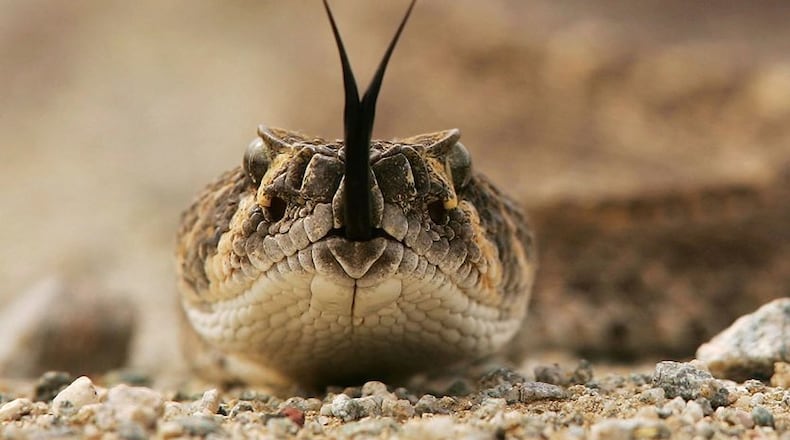Most people spend more time outdoors in the summer, which is also prime time for many creatures to look to you as their next meal. The following are some of the most common creepy-crawly hazards in Georgia, including information on how to prevent or avoid them and what to do if you're bitten:
Snakes
How to prevent them: If you're outside on your lawn or on a hiking trail, chances are fairly good that you're sharing the area with a snake. Fortunately, the vast majority of snakes in Georgia are non-poisonous. However, copperheads, which can be identified by back markings that look like hourglass-shaped saddles, can often be found in Atlanta. They're attracted by ivy and still, standing water about three inches deep, according to Matthew Field, owner of All Wildlife Control in Alpharetta. "I'd personally get rid of the ivy if I had a copperhead," he said.
To help avoid snake bites, watch where you step. Avoid tall grass or brush, fallen logs and deep holes in the ground. If you do have to go through these areas, using a long stick to poke at the ground ahead of you as you go to scare away snakes.
What to do if you're bitten: If you're bitten, call 911 or the national Poison Control Center (1-800-222-1222). They can offer immediate advice. Until you get to the hospital, keep the affected limb even with the rest of your body. Don't eat, drink or take any medication. Even if you feel certain that you were bitten by a non-venomous snake (and you could be wrong), wash your wound with warm, soapy water and seek immediate medical attention. Try to remember what the snake looked like, but don't worry about trying to catch it, since this could be dangerous.
Chiggers
How to prevent them: Chiggers, or red bugs, peak in midsummer and continue into late fall. Only a hard freeze will manage to kill them off.
Eliminate places where chiggers are commonly found, such as in decaying pine stumps and leaves. In addition, try to make your lawn less hospitable to rabbits and mice, which serve as natural hosts for chiggers. This means clearing out underbrush and cutting back overgrown shrubs and bushes. If you're going to be in an area where chiggers thrive, apply insect repellent containing DEET to your skin.
What to do if you're bitten: If you think you've been bitten by a chigger, check yourself all over for small red dots that may be moving or attached to your skin. Take a bath or shower to help remove them, and wash your clothes in hot water. If you've been bitten, you'll definitely itch, but a chigger won't transmit any disease. Itching will last a week or so, even after you remove the chigger. You may also develop bumps, blisters or a rash. An over-the-counter anti-itch cream such as hydrocortisone or calamine can provide relief in the meantime, as can an oral antihistamine. You usually won't need another further treatment unless your itching and swelling is severe or a bite becomes infected.
Mosquitoes
How to prevent them: Mosquitoes thrive in standing water, so make sure you eliminate anything, like an empty flower pot, that can serve as a breeding ground for these pests. Tightly cover storage containers so mosquitoes can't get inside and lay eggs, and empty and scrub containers such as buckets and trash cans once a week. If you're outside anytime from dusk to dawn, it can help to wear long sleeves and pants, as well as insect repellent that contains DEET.
What to do if you're bitten: Wash the area with soap and water, and apply an anti-itch cream. It can also help to put an ice pack on the bite and take an over-the-counter antihistamine.
Of particular concern this year is the Zika virus, which is transmitted when a mosquito feeds on an infected person and then bites someone else. Georgia has had at least 13 travel-related cases of the disease, but there haven't been any known cases of local transmission of the virus by mosquitoes in the contiguous 48 states.
About the Author
Keep Reading
The Latest
Featured


